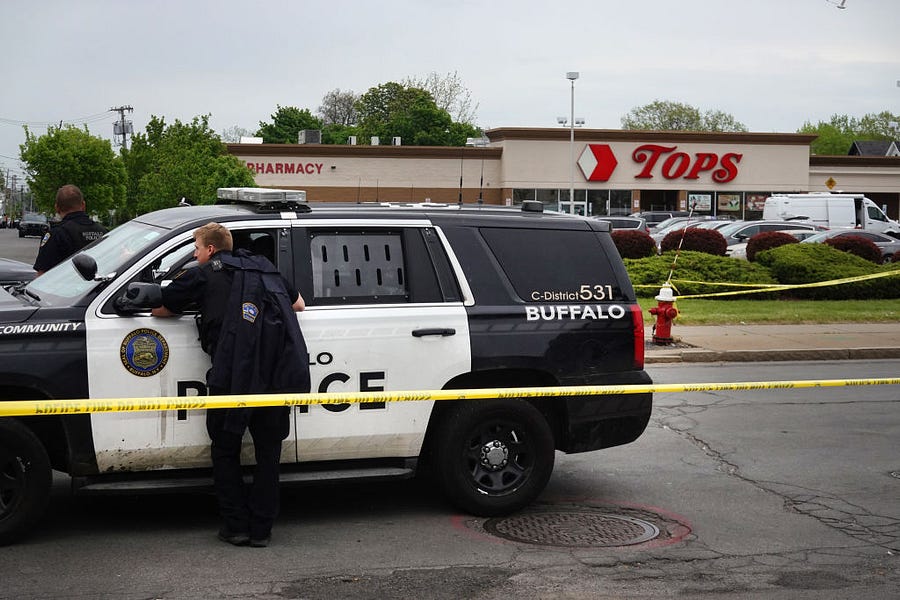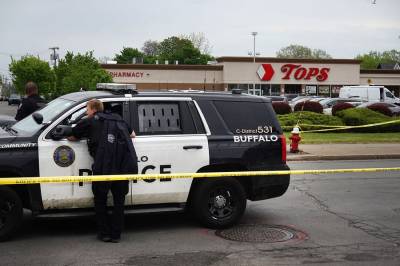The recent massacre in Buffalo, New York, has brought “red flag laws” back into the spotlight because of the possibility the policy could have prevented the shooting. But what exactly are red flag laws and how many states in America have adopted them?
Red flag laws allow certain people to request that a court temporarily prohibit individuals from buying or possessing guns if they are deemed to be a threat to themselves or others by using an extreme risk protection order (ERPO). The orders can generally be obtained quickly in the short term during emergency proceedings where the subject of the order may not be present to defend themselves. However, they also usually require a more detailed hearing in order to be extended to a full year.
If an ERPO is granted, the subject of the order will be barred from buying guns and forced to give up any firearms he or she already owns for as long as it's in effect. Connecticut was the first to implement a red flag law back in 1999 but their popularity grew in the aftermath of the 2018 shooting at Marjory Stoneman Douglas High School in Parkland, Florida.
Currently 19 states and the District of Columbia have some form of this policy. All of them, except Florida's, have passed in states controlled by Democrats or that have divided government.
The policies are similar in concept but those eligible to request an ERPO and the process for granting one vary from state to state.
Family members, police, prosecutors, and school officials can request an ERPO in New York. The application will be heard the same day it's filed and a judge can issue an immediate seizure notice for the target of the order that day. A hearing with witnesses and evidence will then be held within 10 days of the initial order. If the judge decides there is clear and convincing evidence that the person subjected to the ERPO is a threat to himself or others, the order can be extended for a year.
In the case of the alleged Buffalo shooter, there were several parties who could have requested a red flag order based on his past behavior. The alleged shooter expressed a general desire in a school assignment to kill himself and others in June 2021. As a result, he was taken by police for a psychological evaluation and spent a day and a half in a mental hospital, according to NPR.
However, he was released and no further action was taken.
If either the police, school administrators, or his parents had filed for an ERPO, the shooter likely would have been prohibited from buying the gun he used in his attack. The shooter's clear willingness to break dozens of laws, including by illegally modifying his gun, implies he may have been willing to buy a gun illegally even if subject to an ERPO. But making his acquisition of a gun more difficult very well could have prevented the attack.
Even if we assume it would have, there's still the question of how effective ERPOs are in general. Can they stop mass shootings? What do studies say?
A Rand Corporation review of available studies on red flag laws shows the evidence of their impact is pretty inconclusive at this point. There hasn't been a lot of scientific research into the topic yet. And the studies that do exist have significant shortcomings.
Rand found there were no studies that identified conclusive evidence red flag laws had a positive or negative effect on outcomes including mass shootings, violent crime, and suicide. It did identify some studies that presented inconclusive evidence the policy may reduce suicides, a common refrain among ERPO advocates.
"These studies offer some evidence that ERPOs may be effective at reducing firearm-related suicides, but their results hinge on an extrapolation of the number of suicide attempts rather than observed suicide attempt data or a formal comparison group," Rand said on its website.
It noted there is some evidence to suggest ERPOs may also help prevent some mass shootings. Rand said one study found 21 of California's ERPOs "involved an individual who had access to or was planning to access firearms and expressed or exhibited behavior suggesting intent to perpetrate a mass shooting." But the group said "the impact of ERPOs might be concentrated in suicide rates rather than rates of mass shootings or homicides" because the vast majority of ERPOs in states where data has been analyzed are used for those who expressed suicidal thoughts.
ERPOs are not without their downsides. The policy has made little progress in Republican states, with opposition based on gun and civil rights concerns. The lack of robust due process protections has been a sticking point for many gun-rights advocates.
The use of ex parte hearings, where the subject of the order isn't able to argue in their defense before the confiscation order is issued, has engendered considerable backlash. The same is true for states that allow many different kinds of people to request ERPOs. The combination, advocates warn, could lead to disgruntled family members or co-workers to target law-abiding and stable gun owners for harassment.
They may also further dissuade gun owners from seeking mental health treatment if they fear their guns could be seized as part of the process. Clearly most people who attend therapy or counseling are not a threat to themselves or others and discouraging mental health treatment, even unintentionally, is likely to increase negative outcomes.
Rand hasn't identified any studies that provide evidence ERPO have had those effects on a broad scale yet either, though. The group said more research is necessary.
"Further effort to provide detailed process and outcome evaluations in other states with ERPOs would greatly advance research about the orders’ likely effects," the non-profit concluded.
Until then, Americans will have to work off of anecdotes and their best judgment to decide on whether to support red flag laws.
Stephen Gutowski is the founder of The Reload, which focuses on sober, serious firearms reporting and analysis. You can subscribe to The Reload's free weekly newsletter or buy a subscription for access to exclusive content.







Please note that we at The Dispatch hold ourselves, our work, and our commenters to a higher standard than other places on the internet. We welcome comments that foster genuine debate or discussion—including comments critical of us or our work—but responses that include ad hominem attacks on fellow Dispatch members or are intended to stoke fear and anger may be moderated.
With your membership, you only have the ability to comment on The Morning Dispatch articles. Consider upgrading to join the conversation everywhere.